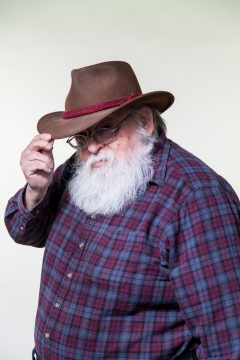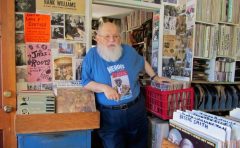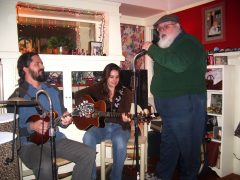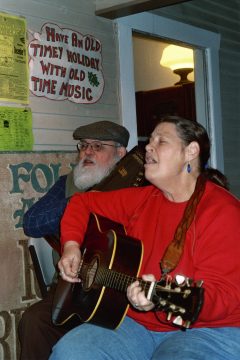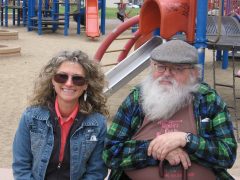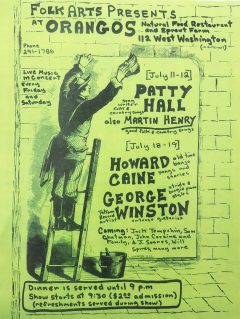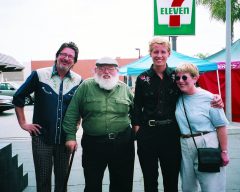Featured Stories
Lou Curtiss RIP: July 2, 1939—July 8, 2018–The King of Vinyl
The King of Vinyl has died. Lou Curtiss, founder and owner of San Diego’s Folk Arts Rare Records for 47 years, and founder of the San Diego Folk Festival, passed away at his home on July 9, according to his wife, Virginia.
The San Diego Troubadour reported the news as follows:
I am very sad to share the news that Lou Curtiss has died. He passed away yesterday at his home in El Cajon. He was 79 years old. San Diego has lost a true legend. He was a tireless champion and promoter of folk and traditional music in our town, not to mention a record collector, radio dj, archivist, columnist, festival organizer and promoter, and keeper of the flame for all old-time music. We shall miss Lou, but will continue to run an occasional column in the San Diego Troubadour from the vast archive of 17 years of his story-telling in our paper. Much love and thank you for all you have done for the music community, Lou. Stay tuned for news of a celebration of life, which will happen in October some time. Please keep Virginia Curtiss and their son Ben in your thoughts and prayers.
–Liz Abbott
As a teenager in San Diego in the 1950s Lou and his friend Frank Zappa used to scour used record bins for old records–Zappa to fuel his emerging life as a composer and Lou to expand his growing collection of rare folk and jazz records, the foundation of what would become Folk Arts Rare Records in 1967setting up shop at the corner of Washington and India Streets (now Gelato Vera). That store, which eventually ended up on Adams Avenue, would become the hub and center of the San Diego Folk Festivals and Adams Avenue Roots Festivals that he founded. They took over the entire avenue every spring for a weekend of folk music and mayhem, presented free to the San Diego community.
It was a joy for both fans and performers–and satisfied all music tastes from the raucous soloists and bands in the walled-in Beer Garden to the deep and meaningful songs reserved for the Church Sanctuary, and the protest songs highlighted in the Church Social Hall. In between there were a dozen indoor and outdoor stages from coffeehouses to impromptu folk festival street venues that packed ’em in from one end of Adams Avenue to the other. All of it reflected Lou Curtiss’ vision of folk music as the people’s music: unfiltered and uncensored for young and old alike. And, always somewhere along the way one would encounter Lou himself, leaning back with his gorgeous autoharp on his lap, presenting his old-time version of a Carter family song, an old gospel tune or a rare blues song he had rescued long ago from one of those ancient record bins.
He married Virginia, his backup guitarist, in 1968, the year he produced his second of 55 folk festivals he organized through the decades, both the Adams Avenue outdoor fests and the more carefully curated San Diego Folk Heritage Festivals, where one would see San Diego folk singer and marine biologist Sam Hinton and touring artists like Ramblin’ Jack Elliott and U. Utah Phillips, the Golden Voice of the Great Southwest–along with Mike Seeger and the New Lost City Ramblers–the very best of the 1960s folk revival. Lou collected their records, and gave them much appreciated live opportunities to perform as well.
In addition Lou hosted a weekly radio show called Jazz Roots on KSDS FM88.3 on Sundays at 8pm (Jazz88.org). Between the radio and his record shop and the folk festivals Lou spent his life educating San Diegans about American roots music, a congenial host with an encyclopedic knowledge of all things folk and jazz. But he was far more than a local hero–he was a national treasure who was also a music archivist for the Smithsonian Institution and Library of Congress. Lou was an early influence and mentor for the likes of Tom Waits, Mojo Nixon, and A.J. Croce.
On a more personal note, Lou was a special friend to me in booking me for the Adams Avenue Roots Festival year in and year out and giving me some unusual first-hand help for a song I was working on about Wild Bill Hickok. I let him know what I was doing and asked him if he might have some information in his vast trove of recordings at the store, which was always my last stop before leaving San Diego. A couple weeks later I got a tape cassette from Lou with the fruit of his dedicated research deep in his archives: three songs from early vintage country and folk artists who shared my love of Wild Bill, transferred from ancient 78s to one tape. Without Lou’s help I couldn’t have completed my song, which was typical of his generosity toward his far-flung fellow troubadours. He was truly one of a kind.
Just as typical of Lou was his beautiful tribute to 12-string guitar master player and builder and Folkways recording artist Fred Gerlach, who also lived in San Diego. It was from Lou that I learned of Gerlach’s passing eight years ago. For it was Lou and only Lou who cared enough to write in and post his account of knowing Fred to a paid on-line memorial page:
Mr. Fred Gerlach; August 26, 1925—December 31, 2009; San Diego;
I first saw Fred at the old Circe’s Cup Coffeehouse and the Upper Cellar sometime in the late ’50s. I booked him at the old San Diego State Folk Festival in the late ’70s and at the Adams Avenue Roots Festival and the Adams Avenue Street Fair in the ’90s. I did a fairly extensive interview with him around that time and had him on my Jazz Roots radio show.
I talked to him some about his tape library and mine and what would happen to them. Well, in 2007, I got a grant to digitize my library for inclusion in a special collection at the Library of Congress (with copies going to the UCLA Folklore Department where students can get at them). Along with my tape collection are the collections of Sam Hinton and others from the ’50s, ’60s, and so forth. I’d love to include Fred’s tapes in that collection. He gave me a copy once of a letter he got from Woody Guthrie. Any letters like that should be preserved. My Best and with all our sympathy, Lou, Virginia, and Ben Curtiss, January 16, 2010.
Thank you, Lou, for a life well-lived, on behalf of American roots music and musicians going all the way back to the beginnings of recorded music–as faithfully preserved on the sagging shelves of your historic record shop–Folk Arts Rare Records–and in your own mind, which housed a treasury of American folk music.
* With thanks to Richard Pollard for sending me Liz’s report of Lou’s passing.
A memorial for Lou is in the planning stages and will be held in October. Stay tuned for further information in the San Diego Troubadour, the Troubadour Facebook page, Folk Arts Rare Records website and Facebook page, and Louis F Curtiss’ Facebook page.
Folksinger Ross Altman has a Ph.D. in modern literature from SUNY-Binghamton; he belongs to Local 47 (AFM); Ross writes for www.folkworks.org and can be reached at greygoosemusic@aol.com
I’M GONNA MISS YOU, LOU
Weaving Night Patterns
“…here’s a poem written at and about Sweet’s Mill in my first year there, 1966…”
Lou Curtiss, San Diego, California
I hold within my hands
Some bits of moving moon light
Woven with the lake shore
And leafy, earthy, ferny paths,
And blue and brown mountain rock,
And shadows green;
The eventide is there quite blue, serene, and lovely
About the fragrant air, the music clings
And there are birds that soar in quiet grace above us
All bordered with a song a young girl sings.
Conceived and about Sweet’s Mill at Folk Arts, August 7, 1966, second draft.
(Reprinted from At the Mill: The Story of Sweets Mill California, compiled and edited by Patty Hall, 1975. Skimpy Publications. Used by permission)
My friendship with Lou Curtiss goes back a long way: 45 years to be exact.
In 1973, I was a 25-year-old folklore grad student at UCLA, studying Anglo-American Folksong. While toiling in the halls of ivy, I was intent on also making my mark as an old-timey folk musician and songwriter in and around Los Angeles. Howard and Roz Larman (who had hosted me a few times on their KPFK radio program “Folkscene”) suggested I send a cassette of my songs to a friend of theirs in San Diego who had a great little used record store/performance venue and, not incidentally, also booked the annual folk festival held at San Diego State.
I’d already sent out a handful of scrappy little homemade demo tapes to several southern California coffee houses and music venues, with nary a nibble. So, I was taken aback when the phone rang one morning, and the caller identified himself as Lou Curtiss, saying he’d listened to my tape and invited me to come down to San Diego in a few weeks to perform at his shop, Folk Arts Rare Records. I was thrilled and scared and, at the time, had no idea that this unexpected phone call would initiate an extraordinary friendship and put me on a life-changing path.
When I arrived in San Diego, guitar and banjo in hand, and finally found Folk Arts, located at 3743 Fifth Avenue in Hillcrest (where the Beauty Lounge now stands), I bashfully ventured inside. Records, crafts, artwork, rag rugs, a folding screen, and chairs filled the one-room shotgun storefront. The walls were festooned with records out of their jackets, posters, photos, and hand-lettered handbills from past shows and festivals. Old-time fiddle music wafted out from a turntable.
And there, toward the back of this shop of wonders, was Lou Curtiss–bespectacled and bearded, standing quietly and inscrutably, his arm draped casually over one of many carefully curated, meticulously labeled bins of vinyl and shellac audio treasures. Then, Lou spoke, greeting me simply, “Oh, hi Patty,” as if we had known each other for years.
And, so began an amazing, decades-long musical and musicological friendship with Lou Curtiss and his wife, Virginia. Over time, I grasped the vastness of Lou’s encyclopedic knowledge and passion about saving old music and promoting grass-roots musicians of all ages, many times finding older or forgotten ones, urging them out of obscurity or retirement to perform and record again. I learned that he was a tireless and careful archivist, a long-time poet–and that he was an excellent old-timey musician. I also got to know Virginia, a gifted scientist and talented photographer, and terrific musician as well.
As our friendship grew, I remained delighted by Lou’s earthy sense of humor and his world view, expressed in plain-spoken, unapologetic observations that cut like a knife through the crap and hoopla of modern times.
By 1975 (the year I left LA for Nashville for a folklore internship at the County Music Foundation/Hall of Fame), I’d made many more trips to San Diego to perform at Folk Arts and also at the San Diego Folk Festival. One time, instead of the usual cash honorarium, Lou agreed to pay me with six exquisite pottery wine glasses, crafted by a local artist–ones I still use and treasure.
During my 25 years in Tennessee, the Curtisses and I kept up with each other, mostly through cards at holiday time. I was delighted one year to receive a photo card featuring their adorable new baby, Ben, sitting next to an old 78 record.
Time passed and I stayed on in the South, writing books, raising our son, playing a little old-time music here and there, and doing a bit more songwriting, But the folk/old-timey scene in Nashville was nothing like I’d recalled it being in Southern California in the early 1970s, and there was certainly nothing like Folk Arts, the San Diego Folk Festival, and no one like Lou and Virginia Curtiss.
Fast forward 30 years to early 2003. My husband Barry, son David, and I had moved back to California several years before to be closer to family. As part of my “re-entry,” I’d made a list of some old San Diego Music friends to look up and say hello to. Lou and Virginia were at the top.
When my brother Mike and I found Folk Arts Rare Records (by this time, located in Normal Heights on Adams Avenue across from Vons), I braced myself for changes. Different neighborhood, different decade, different setting. After all, it was 30 years later. But, as we ventured up the creaky front steps of the old bungalow and entered, you could have knocked me over with a feather.
The walls were still covered in photos, along with handbills and posters with the familiar “Lou” calligraphy. Multiple record bins, carefully labeled, still bulged with old 33s, 45s, and 78s. A 1930s Delta blues record played softly in another room. The whole place looked the same, felt the same, sounded the same, smelled the same–a shrine to the down-home, the hand-crafted, the home-made, and the way-back.
And there–at the side of the store, stood Lou–still bespectacled, still bearded (though now a more curmudgeonly shade of white), arm still draped over a record bin. Then he greeted me as if no time had passed: “Oh, hi Patty,” as though we’d spoken just yesterday or had picked some tunes together on the porch the week before–a quiet affirmation of ongoing friendship and the welcome back home I’d been longing for.
A year (and a few open-mics) later, while still working on a long-term plan for easing back into the local performing scene, I was startled once again by an unexpected phone call from Lou Curtiss. He was calling to invite me to perform at the 2004 Adams Avenue Roots Festival, successor to what had once been the San Diego State Folk Festival. Though nervous and feeling not quite ready, I swallowed my trepidation and said, “Yes.”
And, this is what put me on the path, once again, to re-embrace my music and performing, after many years of letting it go by the wayside–in, of all places, Music City, USA. It took Lou to bring me back.
There are so many more facets to Lou Curtiss and his remarkable legacy–his column in the Troubadour; the fierce championing he did on behalf of old-timey and traditional blues musicians; his insistence on keeping Roots Music at the center of the Roots Festivals; the tireless digitizing of his vast music archive so it would be preserved for future generations; his ongoing suspicion of the artificially packaged, heavily commoditized commercial music business.
But the main memory I’m left with is a very personal one. In the midst of dozens of consuming projects, events, and life pursuits, Lou made time, not once, but twice, to offer up just the right kind of nudge and validation when I needed it most. Two life-changing wake-up calls–the first, to a shy, 25-year-old musician/student who hadn’t yet found her sea legs as a performer; and the second, to a 52-year-old-almost-empty-nester, who returned to town, longing to reconnect with the local folk music scene.
Lou, I’m going to miss you like crazy. But if I’m lucky enough some night to hear the strains of the old-time celestial choir, I’ll be listening for you and your autoharp.
–Patty Hall
Love, Gregory
None of us were prepared or ready to wave farewell to Lou Curtiss as he quietly slipped through the thin veil, heading toward that Big Rock Candy Mountain.
It’s impossible to convey with words the impact Lou Curtiss had on my personal and professional life. His record shop was my one-room schoolhouse. Absorbing his knowledge with undivided attention and unbridled imagination, it was the only school where I became valedictorian. I learned how to listen with refinement to those nearly forgotten songwriters and songbirds as Lou imparted history and humor with each song we spun on his electric gramophone, rewinding further and further back in time until we were practically listening in black-and-white. On many occasions someone would interrupt our listening session to drop off a box of LPs. Lou could rifle quickly though hundreds of albums looking for that rare record. Mostly in the box were 101 Strings or Montovani albums, which he set on the front porch with a hand-written sign that read “Free.”
Lou and I held court each Thursday night at Java Joe’s. As I would spin a 78rpm record on a 1920’s HMV Talking Machine, Lou would explain to the audience some insightful, humorous story about that recording. Virginia Curtiss, who would be knitting at a table, would sometimes interject her lighthearted wisdom and complement Lou’s pontificating.
The dusty reels of tapes Lou recorded of the Folk Festivals he presented plus his private collection of 78rpm records are as important as the Dead Sea Scrolls. With an ocean of memories left behind for those of us who had the good fortune to know him, all I can simply say are two words. “Thank you, Lou.” (I was never good at math.)
–Gregory Page







